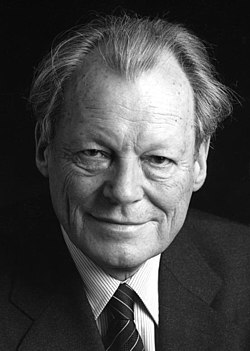This article needs additional citations for verification .(March 2025) |
Second Cabinet of Willy Brandt Cabinet Brandt II | |
|---|---|
| 9th Cabinet of the Federal Republic of Germany | |
| 15 December 1972 – 6 May 1974 (until 16 May 1974 as caretaker government) | |
 | |
| Date formed | 15 December 1972 |
| Date dissolved | 16 May 1974 (1 year, 5 months and 1 day) |
| People and organisations | |
| President | Gustav Heinemann |
| Chancellor | Willy Brandt (until 7 May 1974) Walter Scheel (Acting; from 7 May 1974) |
| Vice-Chancellor | Walter Scheel |
| Member party | Social Democratic Party Free Democratic Party |
| Status in legislature | Coalition government |
| Opposition party | Christian Democratic Union Christian Social Union |
| Opposition leader |
|
| History | |
| Election | 1972 West German federal election |
| Legislature terms | 7th Bundestag |
| Predecessor | Brandt I |
| Successor | Schmidt I |

The Second Brandt cabinet was the government of West Germany between 15 December 1972 and 16 May 1974, during the 7th legislature of the Bundestag. Led by the Social Democrat Willy Brandt, the cabinet was a coalition between the Social Democrats (SPD) and the Free Democratic Party (FDP). It followed the Cabinet Brandt I. Following Brandt's resignation as Chancellor on 7 May 1974, Vice-Chancellor Walter Scheel (FDP) served as Acting Chancellor for nine days, until the inception of the Cabinet Schmidt I.